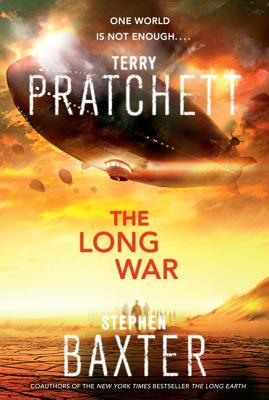This week I've returned to the Long Earth with the sequel, The Long War. As you may remember in my review of The Long Earth, I was a little dissatisfied with the preceding book. However, I am usually one to give something a second try, especially after the first book because it might take a while for a series to find its stride. Unfortunately, The Long War simply wasn't it. With the series continuing in The Long Mars, I find myself not terribly interested in seeing where this series is going, and I'll try to explain why. But despite the enormous potential of this series it just continues to fail to deliver and the result is unsatisfying to say the least.
As you may recall, The Long Earth introduced us to the concept of a series of worlds, perhaps an infinity of worlds, similar but different to our own Earth, that can be reached simply through the use of a device known as a Stepper. Instead of being confined to a single world with a degrading ecosystem and diminishing resources, humanity now has access to millions of verdant worlds with practically unlimited resources. Suddenly the solution to all the pressures of humanity are literally just a step away. To be honest, the existence of a nearly infinite supply of worlds and resources poses interesting social, economic, and political questions and it would be interesting to see how humanity responds. (As well as the discovery that we are not alone and we have sapient hominid cousins throughout the Long Earth.)
Although initially ambitious, and promising to investigate several really interesting ideas about how the Long Earth would reshape society, The Long War spreads out too quickly and suffers from an incredible lack of focus. There are something in the neighborhood of five or six different plots going on in The Long War, ranging from the distant "colonies" of the outer worlds demanding equal treatment and representation in old Datum Earth's government, to humanity's treatment of the trolls, to China's expedition to the world of East 20,000,000. I almost feel like this is akin to a Philip K. Dick novel where there are a ton of interesting ideas presented but the authors go off into a lot of different directions instead of focusing on one story. I think if the authors had focused on one story for this novel, instead of splitting attention between five or six different plotlines, it would have resulted in a more coherent story overall. The result is a muddled mess of five different stories, none of which were developed or resolved much to my satisfaction.
Another thing I noticed, although this seemed to get better as the book went on, was a lot of things happened off-screen or were told in past tense or passive voice. It would have been interesting to see the rebellion against the Datum government develop as the pioneer's rights were slowly stripped away by a government pandering to increasingly xenophobic masses at home. Instead we're told about it after the fact as background material. Again, it's something I really noticed in the beginning of the book, and this may be because the authors decided to jump forward ten years from the ending of Long Earth so they had to cram in exposition somewhere, but it's pretty unsatisfying on my end.
For me the greatest sin of The Long War was that it became boring. An infinity of Earths for humanity to explore, colonize, and fight over offers practically limitless potential for numerous interesting stories. Unfortunately five plots which could have been interesting if properly developed in their own direction, become five lackluster plots that I ended up not caring terribly much about. I honestly found myself over 80% of the way through the book and just saying to myself, "Oh my god, when will this be over?" Instead of getting excited I just found myself bored, something you never want to be when you're reading a book.
I'll be honest, I'm probably not going to read The Long Mars because I have a very strong feeling it's going to be more of the same. As much as I love Terry Pratchett, this just doesn't seem to be his best work. I personally do not know much about Stephen Baxter and I may want to look at his books in the future, but I feel like this particular collaboration of authors simply isn't working.
- Kalpar


No comments:
Post a Comment